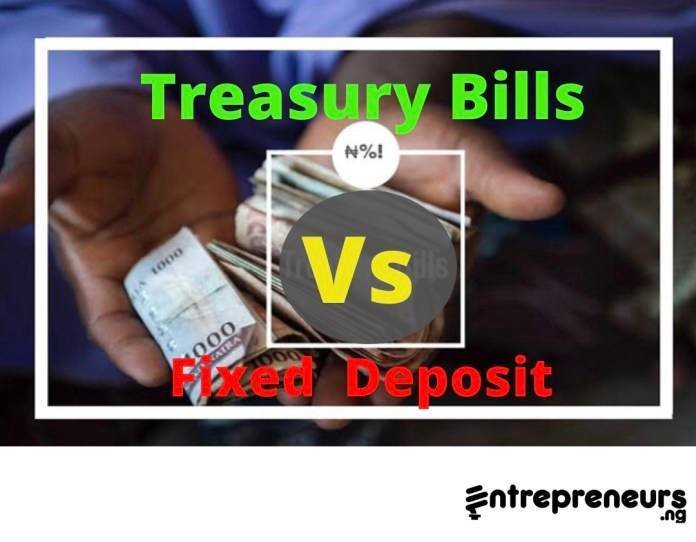Clearly, some investment portfolios can put you in a state of choosing between the devil and the deep blue sea. However, it is only ideal for you to understand both before making a choice. Today we are going to be looking at fixed deposit and treasury bills.
Both investment portfolios are short term and are both low risk, and low return type of investment. The fixed deposit versus treasury bills debate has been on for a long time, to the extent that a lot of people get to confuse them.
What Is A Fixed Deposit?
A fixed deposit is a type of short-term financial investments sold by banks to its depositors. A depositor invests in a fixed deposit when he deposits his money with a bank in exchange for interest for a predetermined period.
What Are Treasury Bills
Treasury bills are investments schemes that, as an investor, you can lend money to CBN for a stipulated period in exchange for interest. They are short term investment in government instruments and are usually placed for 91 days, 182 days, or 364 days tenure.
Who Controls The Investment
The person who controls the investment is one area of discussion in understanding the fixed deposit and treasury bills investment portfolio. When you buy treasury bills you are basically lending money to the government, through the Central Bank of Nigeria (CBN). You can get your capital back within 91 days, 182 days, or 364 days moratorium depending on your investment choice.
However, with a fixed deposit, you are lending money to a bank or an investment house with a promise to repay you at the expiration of the tenure (usually between one to twelve months).
So, one lends your money to the government, the other lends it to a bank or a large financial institution.
Difference Between Fixed Deposits And Treasury Bills
We are going to look at the difference between fixed deposits and treasury bills by looking at the factors you have to consider before you invest.
What Are The Risk Involved?
Even though they are both low-risk investment portfolios, there’s still an element of risk when you look at fixed deposit and treasury bills.
Treasury Bills are backed by the full faith and credit of the government and as such, they are seen as almost risk-free because it is very unlikely that a government can go bankrupt and not be able to pay back its loans.
More so, there is a tax revenue stream that the government uses to service its debts, once the due date is reached based on the moratorium.
But, fixed deposits are backed by the credit rating of the bank or the financial institution. The financial institution or bank has a fiducial obligation to pay you back your capital, immediately your moratorium is reached.
However, anything can happen to the bank. When the chips are down, there is every possibility of parting ways with your investment. With the fixed deposit and treasury bills argument in mind, it’s audible to the deaf, that treasury bills are of lower risk and perceived to be better as regards risk management.
The Interest Rate Of Fixed Deposit Versus Treasury Bills
The capital/financial market has a risk-reward model of low risk-low return, high risk-high return. With this financial market investment model, the fixed deposit should have a higher interest rate.
However, there are times where the pendulum switch sides and the reverse becomes the case. Using Nigeria as a case study, the interest rate for treasury bills is now on the single-digit scale, an all-time low of between 1% to 5%. Prior to this time, the rate used to be between 10% to 14%.
The fixed deposit interest rate for most Nigerian banks right now is not even up to a single digit, as some are in the decimal. Prior to now, it was between 7% and 12%. However, it also depends on your principal. The higher your principal, the higher your return on investment (ROI).
More so, it is good to know that, the interest rate on a fixed deposit investment portfolio varies from bank to bank.
Tax Benefits And Service fees
One beautiful thing about treasury bills is that they are tax-exempt; however, you will be required to pay a bank fee for the services rendered.
The interest gained by fixed deposits is taxable annually, so the interest paid to the depositor is subject to a 10% withholding tax.
For the treasury bill, you get the interest on your investment upfront while the interest for the fixed deposit is paid at the maturity of the investment. I have found out that if you walk into the bank and ask for investment options, they will tell you about fixed deposits and will never tell you about treasury bills.
Why is that? Banks need your deposits to make money, more so when it’s fixed (that way, they’re sure of the money). Also, the fixed deposit investment appears on the balance sheet of banks, unlike the treasury bills investment.
Conclusion:
By now, I’m sure you understand the meaning of the terms treasury bills and fixed deposits. Also, you understand the difference between them and can make informed investment decisions.
How have you been investing? Have you ever tried to invest in fixed deposits or treasury bills? We will like to read your comments. If you found this content useful, please share it with your audience.
Let’s create visibility for your brand today and put your business on the world map. Contact us today to make your brand the preferred choice among our audience of entrepreneurs and business leaders.
ADMIN


